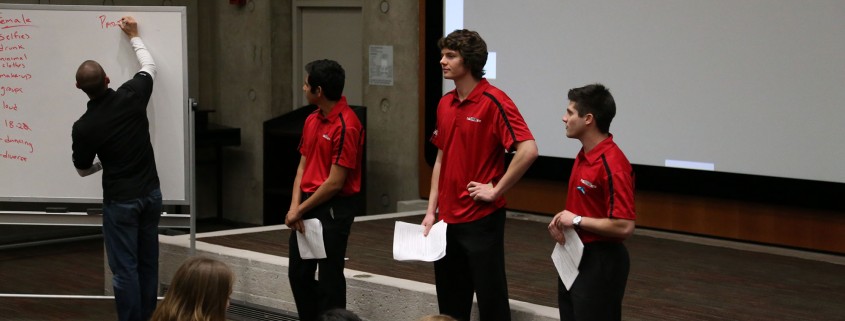I Am That Girl hosted members of FratMANers
USC hosted a discussion with the founder of FratMANers: Fraternity Men Against Negative Environments and Rape Situations in Hoffman Hall last nigh to discuss ways to combat campus rape culture. Four members of FratMANers, an organization at San Diego State University, led a discussion about the increasingly common rape culture on college campuses in the United States.
FratMANers partnered with I Am That Girl: USC, a nonprofit organization started by a USC alumna that attempts to create a support system to empower women, to open up a conversation with USC students about sexual assault, especially in the Greek community, through reading rape statistics, bringing to light myths about rape and sexual assault, addressing gray areas and leading interactive discussions.
Sean Guardian, former President of FratMANers and graduate of SDSU, talked about why it is important for men to join the conversation.
“As a fraternity member, at least, where we are stereotyped … we are statistically the group of people that live in a place where most of that sexual assault happens, and especially in a Greek community that our university kind of prides itself on, it makes sense that it should be something we’re at the front of,” Guardian said.
Guardian continued by explaining that members of the FratMANers all have close female friends they feel obligated to protect from sexual assault.
“All of us have girls close with us on a personal level. Like I said earlier, I wouldn’t want one of my good friends to be sexually assaulted, and if I can put people in a position to stop that, guys and girls, then I feel that is an obligation I have,” Guardian continued.
Samantha Goldberg, president of the I Am That Girl: USC chapter, and Jojo Korsh, vice president, introduced the representatives of FratMANers who started the presentation by explaining why the relatively new SDSU organization is important to them.
Guardian first talked about how and why he got involved in the organization.
“I got involved with this just because it seemed like a cool opportunity,” Guardian said. “A lot of us have girl friends that we go to school with; sisters, mothers, whoever it may be, and it is a big issue,” Guardian said. “It is something that is very prevalent, especially within the Greek community but across all college campuses or any setting that you’ll ever put yourself in. It’s just important to be actually engaged in keeping my friends safe.”
Another one of the representatives mentioned that he joined the program after thinking of his little sister, and he knows that he would expect the university of her choice to have a program like FratMANers in place to educate students in her college community.
The presentation continued with icebreakers that encouraged students to feel more comfortable talking about sexual assault.
The first activity involved students walking to the front of the room and declaring whether they agree, disagree or feel neutral toward incorrect, yet commonly accepted myths. Some of the statements included, “Everyone is a potential rapist,” “if women were clear about their sexual limits, men would not be so confused and forced sex would decrease,” and “overweight or unattractive women are less likely to be raped.”
The next activity involved students closing their eyes and imagining a typical social scene. Then, on a white board, students shouted out characteristics that they would attribute to the males and females in that environment. One of the representatives changed the word “males” to “rapists” and the word “females” to “victims.” During this activity, there was a more serious tone. The activity continued with statistics about rape on college campuses in the United States.
During the last activity, students received slips of paper with scenarios in which it is questionable whether or not to engage in sexual activity.
Other topics brought up during the presentation included victim blaming, partner abuse, regret sex and resources for victims.
Korsh described her feelings about the way rape is handled at USC.
“Overall, the way we deal with rape is really not the way we should… I think that people in this school become idolized, and then the community as a whole doesn’t want to put blame on those people and people are afraid to put blame on them [sic] for their actions,” Korsh said. “I think the school also has an incredible responsibility to report everything, and nothing should ever be under-reported.”

